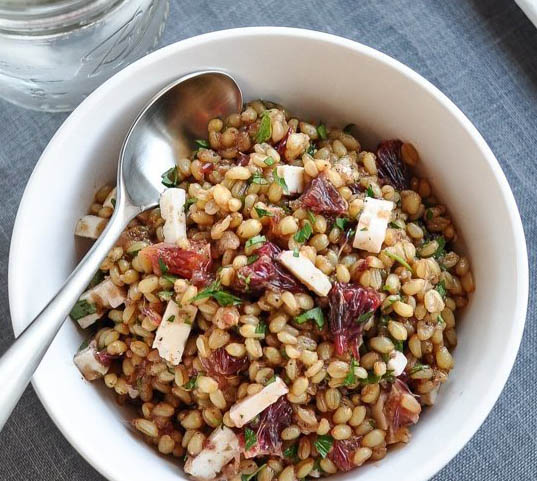Share This
Two new studies hit the news this month, linking whole grains with longer life.
Between them, the two studies (which we’ve summarized on our Health Studies page here and here) examined data from millions of people in more than four dozen different studies, and found evidence showing those who eat the most whole grains had a slew of reduced risks compared to those eating the least, including:
- death from all causes (down 16% in one, 18% in the other)
- death from heart disease (down 18% in one, 16-21% in the other)
- death from diabetes (down 36% in one, not studied in the other)
- plus reduced risk of getting heart disease (down 22%) or cancer (down 15%)
Of course we all die of something. The mortality rate for people reading this blog is an indisputable100%; there’s no research showing whole grains lead to immortality. But isn’t it great to know that eating some delicious foods – like farro salad, a quinoa bowl, or a whole wheat pasta meal – are linked with putting off that appointment with the Grim Reaper a bit longer?
Because this month’s new studies were epidemiological, or observational, studies, they show an association between whole grain consumption and better health, but can’t prove that eating whole grains causes people to live longer or avoid dread diseases.
That doesn’t mean we should dismiss such strong evidence, however. As James Hamblin said in a recent Atlantic article titled Why Whole Wheat is Better than White, “Epidemiology may well be the most important type of research at our disposal to understand the role of food in chronic disease.”
Hamblin (who’s an MD and knows whereof he speaks) explains why most nutrition questions – whole grains among them – are unlikely ever to be settled with a randomized clinical trial, the so-called gold standard that can show cause, not just correlation. He illustrates his point by imagining researchers signing up subjects for a clinical trial:
(Would you help us please by using only white bread for the rest of your life, and see what diseases you get or don’t get? Actually, wait, you can’t know that it’s white bread or that will ruin the experiment. Wear these dark sunglasses always? And let us cauterize your tongue?)
No sense holding our breath, waiting for more proof, when we can easily and deliciously act on the wealth of evidence that already exists. The few existing clinical trials of whole grains have been augmented by hundreds of epidemiological studies showing the many benefits of whole grains. We’ve “thumbnailed” nearly 300 whole grain studies on our website, linking whole grain consumption with improved outcomes in everything from acne to Alzheimer’s, gum disease to gut health, and muscle recovery to Metabolic Syndrome. Take a look, and be dazzled by the range of evidence.
So next time you’re in the store, and your hand hesitates between the white bread and the whole wheat bread that costs 10¢ more… or you’re tempted to grab the same white rice Mom used to serve, without stopping to consider spelt, quinoa, millet or brown rice instead – think about the very real health benefits of switching to whole grains. To paraphrase that cosmetics commercial: “Whole grains, because you’re worth it.”
(Cynthia)



Add a Comment